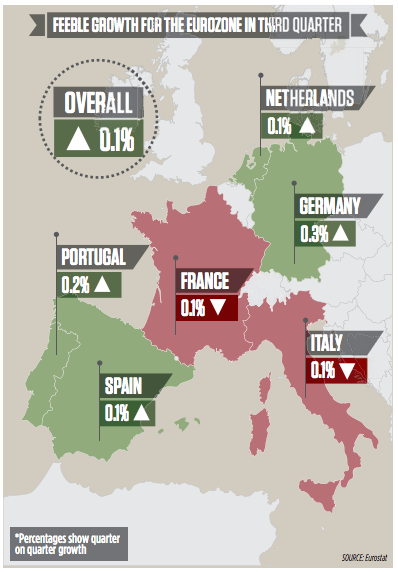Meagre growth for Eurozone as economies slow
GROWTH in the euro area economies stuttered to an even slower pace in the third quarter, with a meagre 0.1 per cent expansion recorded, according to official figures released yesterday.
The currency union’s GDP rose by 0.3 per cent in the second quarter, and the region officially exited an 18-month recession, but the pace of growth has now slowed almost to a halt.
Several countries’ economies actually shrank between July and September: France and Italy both saw contractions of 0.1 per cent.
Germany’s growth of 0.3 per cent from the second quarter helped to prop the figures up, but also saw a slowdown from the 0.7 per cent boost between April and June.
Spain, which was still in recession in the first half of the year, saw growth of 0.2 per cent during the third quarter.

Jonathan Loynes of Capital Economics commented on the disappointing result: “The figures are a clear blow to hopes that the period of market stability seen over the last year or so would translate into a solid and sustained economic recovery.”
Greek GDP data, which was published separately, showed that the economy shrank by three per cent in the third quarter, compared to the same period last year. The pace of contraction is the slowest that the embattled economy has seen since its international bailout.
Data released also suggested that country’s eye-watering unemployment stabilised during August, staying unchanged at 27.3 per cent. Youth unemployment is still climbing upwards, hitting 60.6 per cent, a 5.5 percentage point increase from July.
Last week, the European Central Bank (ECB) cut the benchmark interest rate to 0.25 per cent, after October’s inflation was estimated to be only 0.7 per cent. Markit’s Chris Williamson said the new data “goes a long way to vindicate the ECB’s decision”.